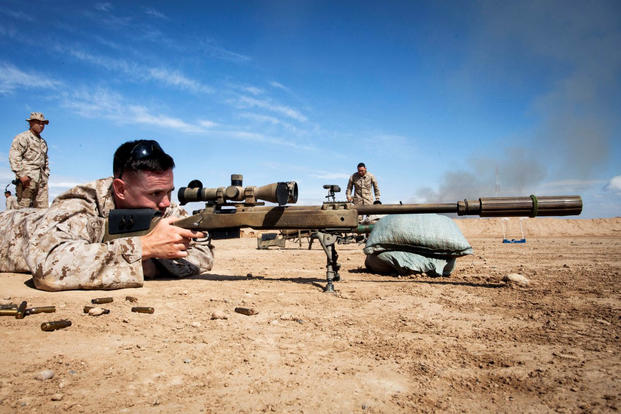The U.S. Marine Corps is sticking with its Vietnam-era, M40 sniper rifle series, despite complaints from scout snipers who say they need the modern, longer-range weapons used by special-ops snipers.
Marine scout snipers are considered to be among the best snipers in the world, but many are frustrated at the limitations of the current M40A5 sniper rifle. The A5 is based on the Remington M700 short-action design that's chambered for 7.62x51mm NATO, like the original M40 Marines used in Vietnam.
Seasoned scout snipers are deadly accurate with the A5 out to 1,000 meters.
Elite special operations units use sniper rifles chambered in more potent calibers such as .338 Lapua Magnum, a round that allows snipers to reach out to 1,600 meters.
U.S. Special Operations Command is currently in the final stage of selecting its new Precision Sniper Rifle for all of its sniper teams. USSOCOM awarded contracts to Remington Defense and another company in 2013 to make two different versions of the PSR – a multi-caliber sniper rifle that allows operators to choose .338 Lapua Magnum, .300 Winchester Magnum and 7.62mm NATO by simply changing barrels assemblies.
The U.S. Army has watched the PSR program, but for now, it is sticking with its Remington M2010 sniper rifle chambered for .300 Win. Mag., a round that allows snipers to engage enemy targets out to 1,200 meters.
Currently, only the most elite Army and Navy special operations units use the MK21 Precision Sniper Rifle chambered for .338 Lapua Magnum. In a July 24 story, The Washington Post quoted a Marine spokesman saying that the service is looking at several options for a new sniper rifle to include MK21.
But Marine officials who oversee the development, testing and selection of sniper rifles are currently planning to replace the M40A5 with the M40A6 -- a weapon that features a skeletonized stock to reduce the weight but still features the same action and fires the same 7.62mm NATO round as past M40 models, according to a source who preferred to remain anonymous but frequently works with the Marine Corps and special operations sniper communities.
Military.com contacted the office of the Deputy Commandant, Combat Development and Integration about this story. Maj. Anton Semelroth, a spokesman for the command, sent the following email response:
"We have made engineering changes to the M40A- series in order to modernize the weapon. Our efforts focused on maintaining its relevance. Within the next year, we plan to field the M40A6 which will incorporate a modular stock to improve portability and shooter ergonomics, an improved barrel and an upgrade of the ballistic calculator to reduce weight and improve accuracy."
"The Marine Corps does have a requirement for a precision engagement capability that exceeds the M40. We continue to pursue a common solution with the Army and USSOCOM and will explore all available options."
For the foreseeable future, however, Marine snipers will have to continue to make due with 7.62mm, the source said.
"The Marines Corps is going to stay with 7.62mm," the source said, describing the service's limited budget. "The .338 is an expensive round; 7.62mm is not."
The Marine Corps scout snipers are at the leading edge of the sniper community.
"They have pushed the 7.62mm round beyond what we thought it could do. … They consistently make shots at 1,000 meters on moving targets," the source said.
But special-operations snipers -- using higher calibers -- are taking longer shots in less time – a reality that has divided the Marine sniper community.
"The younger snipers are saying ‘I could do so much more with what SEAL Team Six snipers are shooting with'" the source said.
Meanwhile, the higher-ranking Marine sniper officials maintain that "the M40 has been doing it for us since Vietnam."
-- Matthew Cox can be reached at matthew.cox@military.com





























